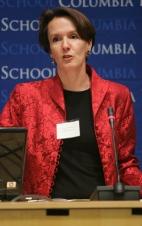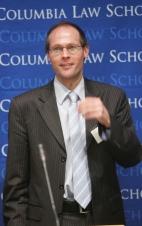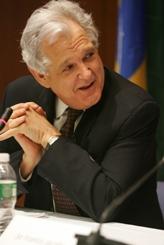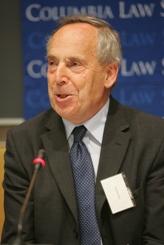Friedmann Conference Examines Efficacy of International Courts
Friedmann Conference Examines Efficacy of International Courts
Speakers at the 34th annual Friedmann Conference focused on the challenges affecting two regional courts in Central America and Europe.
By SUE REISINGER
April 23, 2008 (NEW YORK) - Forty years ago, Wolfgang Friedmann had a vision of an international rule of law. But he could not have dreamed that this vision one day would help street children in Guatemala, win reparations for the family of a Chechnyan activist executed by Russians or see the reform of Chile’s constitution to allow for the showing of the controversial film, “The Last Temptation of Christ.”
“It is a phenomenon of our times,” said Judge Antonio Augusto Cancado Trindade, “that victims in distress, who had lost all hope in justice at the national level ” can seek justice in international human rights courts. Cancado Trindade, a former president and judge of the Inter-American Court of Human Rights (ICHR), spoke at the 34th annual Wolfgang Friedmann Conference, held April 8 at Columbia Law School.
Sponsored by the Columbia Society of International Law, the conference is named for the former Columbia Law School professor who spoke out against the transgressions of Nazi Germany in the early 1930s and soon after left for England.
This year’s conference, “Reform and Challenges Confronting Regional Human Rights Regimes,” critically compared two regional human rights courts. The ICHR is headquartered in Costa Rica and hears claims from countries that ratified the American Convention on Human Rights. The second is the European Court of Human Rights (ECHR), headquartered in Strasbourg. It hears claims from the 47 member states that have signed the European Convention on Human Rights.
Luncheon speaker Professor Lori Damrosch said the two regions’ human rights systems affect the United States, despite the fact that Washington is party to neither court. For example, the U.S. Justice Department and federal courts have leaned on these international courts’ findings in their efforts to thwart terrorism and also to strike down state sodomy laws, said Damrosch, the Henry L. Moses Professor of International Law and Organization. Thus, “ we need to pay attention to regional human rights systems, whether or not we are in the system,” she added.
Professor Sarah Cleveland (left), co-director of Columbia’s Human Rights Institute, led the first panel in examining the structure and reform of ICHR. The court has proved effective in some cases regarding political disappearances and massacres in Latin America, but problems remain. Budgetary restraints prevent the court from taking more than a handful of the thousands of petitions it receives. Moreover, it is hampered because many countries have abstained from participating and that its rulings are often unenforced.
Several speakers suggested possible solutions, with most calling for redefining the role of the Inter-American Commission on Human Rights. Based in Washington D.C., the commission, like the court, is an autonomous agency of the Organization of American States (OAS) that promotes and protects human rights. But the commission’s efforts often duplicate the court’s, thereby wasting limited resources.
One proponent of change was Ariel Dulitzky, visiting professor of law and Latin American studies at the University of Texas, who previously served as an assistant executive secretary with the commission. Rather than examining the merits of a case and duplicating what the court does, Professor Dulitzky wants the commission to concentrate on admissibility of reports, friendly settlements and better compliance. He would like to see the commission “become an arm of the court, advocating and advising the court.”
At least one panelist defended the commission’s work. Elizabeth Abi-Mershed, assistant secretary of the commission, argued that one important role of the agency is to serve victims of human rights abuses, who are often poor and have no access to legal aid.
“To some extent the commission has acted as a prosecutor to move a case forward before the court,” she explained. “Until a legal aid system is offered in the OAS as in Europe, then it is unreasonable for the commission to leave this role.”
The second session of the day looked at the European human rights regime, which Professor Olivier De Schutter (left) called “a system in crisis.” He cited 103,000 backlogged cases, an average of six years to resolve a case and a lack of legitimacy because some applicants receive a dismissal notice with no legal reasoning for it.
De Schutter, a global law professor at New York University and a visiting law professor at Columbia, suggested enacting ways to stem the flow of cases. For example, he said a party should first have to bring a case before a domestic court, with the international court acting as a sort of appeals panel or court of last resort.
The European system “has much to teach, but we need also to learn from its failures,” he said. “It’s naïve to think that existing remedies suffice. And without remedies there are no rights.”
| Columbia Law School's George Bermann (left), the Jean Monnet Professor of EU Law, Walter Gellhorn Professor of Law and Director of European Legal Studies Center, moderated the second panel discussion, titled “The European Human Rights Regime.” Participating on the panel was Sir Francis Jacobs (right), former Advocate General at the Court of Justice of the European Communities and current president of Missing Children Europe. |
|
The final session, moderated by Judge Cancado Trindade, reviewed important legal rulings of the ICRH in San Jose. Panelist Judge Manuel E. Ventura Robles, who sits on that court, stressed that the number of cases decided is not as important as the impact of those cases. Linking democracy with freedom of expression, the Costa Rican jurist focused the discussion on important decisions that have expanded that freedom in Latin America, such as the “Last Temptation of Christ” film ruling against Chile.
Judge Cancado Trindade capped the evening with an upbeat keynote address that began by comparing and contrasting Professor Friedmann’s world of international law with today’s. The judge, who is from Brazil, received this year’s Wolfgang Friedmann Memorial Award for his outstanding contributions and “tireless work…for international peace and justice.” The award is given annually by the Columbia Journal of Transnational Law, founded by Friedmann’s students.
In his prepared speech, Cancado Trindade looked past the flaws of the human rights courts and emphasized the great strides that have been made in four decades. He spoke passionately of the “humanization of international law” and of human beings possessing certain inalienable rights that rise to the level of a universal law of conscience. He cited an “absolute prohibition against torture,” as one such right, as well as a general “right of access to justice.”
Declaring that “human rights constitute the basic foundation of the legal order,” Cancado Trindade welcomed the evolution of international human rights law into the 21st century.
“We can here behold a true right to the law,” he vowed, “[and] the advent of the new primacy of the raison d’humanite [interests of humanity] over the raison d’Etat [interests of the state].”
Sue Reisinger is a reporter at American Lawyer Media.



